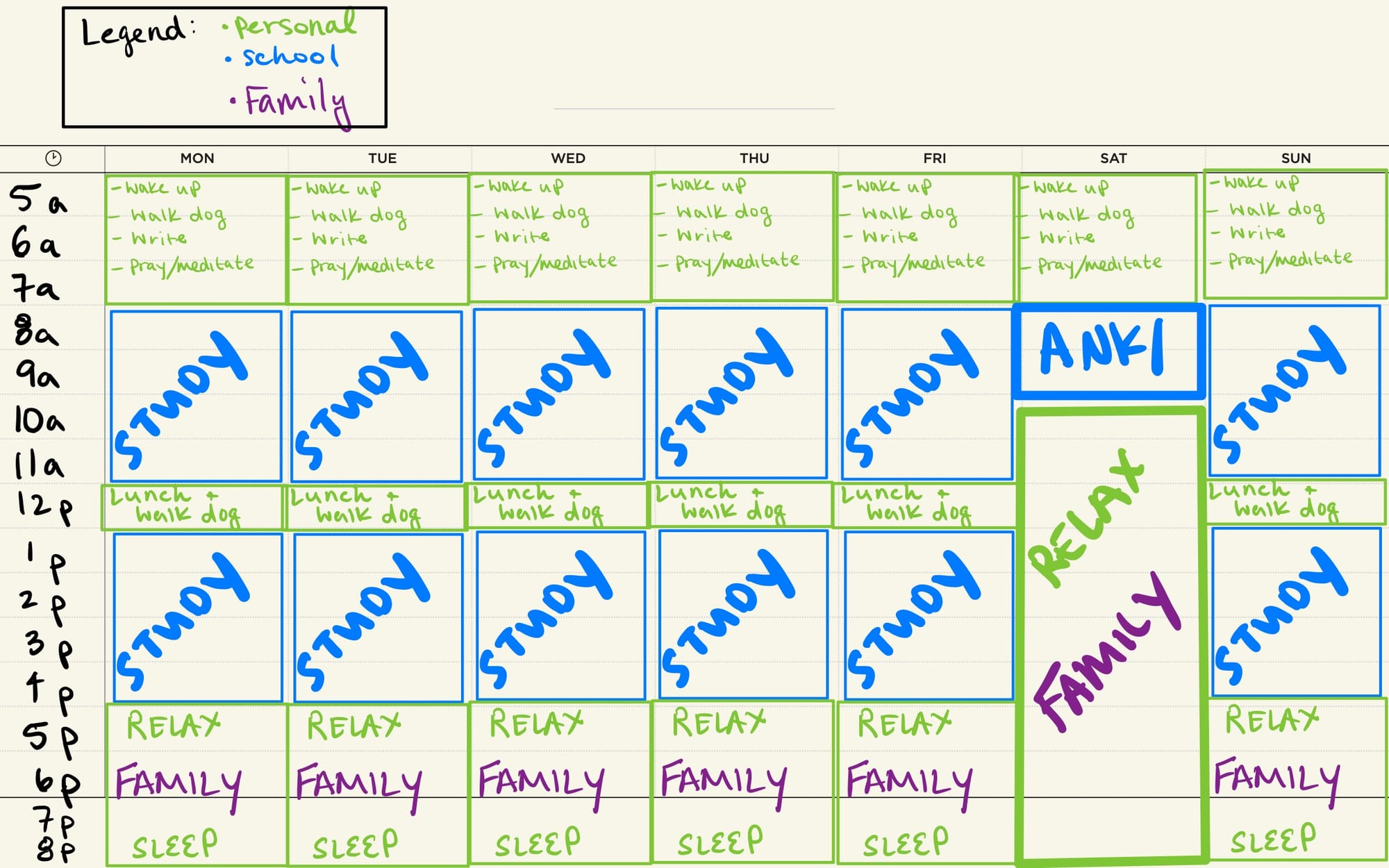My Study Strategy for Medical School

Meta-Macro
My study strategy is intertwined with my time management system. I use a fixed-schedule productivity approach, only allowing myself to study between 7 am and 5 pm every day, except Saturdays (rest day). Leveraging Parkinson's Law, this forces me to find ways to get work done within an artificial time constraint. Additionally, I use a multi-scale approach to planning. Meaning, I begin with the macro ideas and gradually work towards the micro.
First, I create two lists: One reminds me of the principles that are important to me as a student, and the other has broad tangible goals that I want to accomplish on a regular basis. These two lists serve as the foundation for my strategy.
With my principles and goals in mind, I create a general lecture approach that I use as a template at the beginning of every course. I will then refine the strategy for each course as I progress through it. Thus, each course-specific strategy is constantly evolving.
Everything I discuss here is recorded into Notion so I can use my mental energy for learning and being creative, rather than holding on to a substantial amount of information. I explain why I do this in a previous post.
The Two Lists
Principles
- Have a consistent study schedule. As previously mentioned, I study Sunday through Friday from 7 am to 5 pm, taking Saturdays off. Rest is imperative.
- Use Anki every single day. My entire strategy is built upon Anki. I think it’s an incredible tool to facilitate long term recall.
- Learn the concepts, rather than memorize facts. Medicine is logical. I’ll watch videos on 1x if I have to. If I learn it the first time, then I can avoid additional passes on the same material.
- Use the Pomodoro Method to encourage multiple short breaks throughout the day. I do 25/5 when doing my Anki reviews and 60/10 when studying new material. I use an app called Flow on my MacBook to keep track of the time.
- Study deeply with intense focus. I study alone at home and I keep my phone out of sight on Do Not Disturb to minimize distractions. On my short breaks, I’ll avoid my phone and the computer by reading or hanging out with my dog.
- Adaptability is critical. Continue to do things that work and modify the things that don't.
Goals
- Complete Anki reviews every morning.
- Complete ≥4 lectures daily.
- Complete ≤100 new Anki cards daily. Front-load new cards weekly.
- Use Lecture Objectives (LOs) to ensure all testable lecture material is covered.
- Practice questions daily. ≥5-10 from previous blocks only (AMBOSS, Rx, UWorld).
- No new material on Saturdays, only Anki reviews.
Example Schedule

New Material
General Lecture Approach
- Watch Lecture, 2x, pay attention, take minimal notes.
- Use Lecture notes to search for relevant cards in the Anking Overhaul deck. Then, add custom tags and unsuspend new cards.
- Optional: Use 3rd party resource if lecture wasn’t enough to learn the material. I use BnB, Pathoma, or Sketchy. Add the same custom tags and unsuspend cards as mentioned above.
- Go to Anki and study the new cards.
- Repeat for each lecture.
- Stop upon reaching daily new card limit in Anki.
- Do practice problems.
Course-Specific Notes
Again, the general lecture approach is only a template to begin any course with. When I find that some aspect of the template is incompatible with a course, then I take notes in Notion on what I’d do differently instead (e.g. don’t watch Dr. X’s lectures, do [something else] instead). As I progress through a block, the general lecture approach evolves into a more tailored strategy.
I've included a screenshot below of what my notes look like in Notion. You’ll notice that the structure is very similar to the general lecture approach, but each course has a unique strategy.




Comments ()